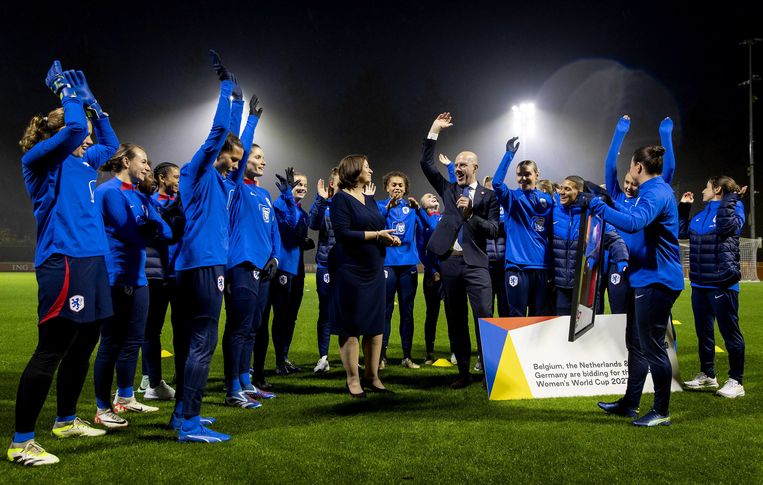
“The Netherlands’ bid for the World Cup has no consequences for the tone regarding the World Cup in Saudi Arabia.”
Gijs de Jong thinks for a moment. The general secretary of the Dutch Football Association has just signed off on a bid to host the Women’s World Cup in the Netherlands, Belgium and Germany in 2027. The word “lobbying” is being used repeatedly at the KNVB campus in Zeist on Monday evening. De Jong should encourage football associations around the world to vote for the Netherlands on May 17 next year. Does this affect how the Dutch FA decides in the near future on the 2034 Men’s World Cup, which recently went to Saudi Arabia in an ambiguous way? After a short internal deliberation: “I don’t think so, actually. I don’t think that’s why we took a different tone.”
As for the procedure for women, it is according to the old book that appeared on Monday evening. In addition to the Netherlands, Brazil, the United States and Mexico are also participating in the race. The 211 unions will therefore have a choice next spring. This was different for men. FIFA granted the right to organize the 2030 World Cup to Morocco and Spain, without a vote, on two different continents. It added three festive matches in South America. Because FIFA is rotating the organization of the World Cup between continents, Asia and Oceania remained for 2034. Saudi Arabia turned out to be the only candidate. Unions still have to vote on the Saudi offer next year, although there is no other option.
The consequences may be critical
It is indicative of the authoritarian way in which President Gianni Infantino controls FIFA. Could vocal criticism from the Netherlands over the World Cup in Saudi Arabia affect its World Cup chances? De Jong: “This may be the case, but the question is whether the allocation is incorrect. The FIFA Council (the highest decision-making body headed by Infantino) has legitimately approved the offer.
It remains that unions can only vote for one country at the end of next year, unlike women. Doesn’t this mean keeping FIFA federations out of the arena? “I don’t want to talk too much about 2034,” De Jong says. “Anyone can run, and only one did.”
Saudi Arabia’s poor human rights record also conflicts with FIFA regulations. The Saudis must explain in the presentation how they guarantee these rights. De Jong will look at this critically. “But we would like to see the Saudi offer first before expressing a strong opinion.” The Secretary-General also analyzed the Dutch 2027 offer in relation to human rights. The Netherlands also needs to look at itself. “For example, we didn’t get a good result on racism.”
At the recent men’s World Cup in Qatar, Middle Eastern European nations were accused of “Western racism” and decadence when they raised the human rights situation in the Gulf state. The Dutch FA also came into conflict with FIFA when FIFA threatened to issue a yellow card if captain Virgil van Dijk wore the rainbow stripe in matches. De Jong says the relationship and cooperation with Infantino is now good again. Their criticism of Qatar did not cause any harm in Asia. “We continue to have a good reputation internationally and receive many positive reactions to our offer.”
Commercially important
De Jong expects great competition, especially from Brazil. “But we are achieving good results in terms of infrastructure and organizational capacity. Women feel safe here, and the Netherlands is relatively stable politically and economically.” But more importantly, the Netherlands, Germany and Belgium are able to organize the World Cup sustainably. For example, there is no need to fly during Championship.
This World Cup is also important from a commercial perspective. Accounting firm PricewaterhouseCoopers calculated the “economic impact.” The 2027 World Cup is expected to generate 194 million euros. However, regulatory costs, which are usually high, are not included. Moreover, according to calculations, the suburban host cities of Amsterdam (76 million euros) and Rotterdam (41 million euros) earn much more than regional host cities such as Enschede (12 million), Heerenveen (16 million), and Eindhoven (30 million).
Read also:
Infantino emerges as the new Machiavelli with Saudi Arabia’s World Cup mission
FIFA awards the organization of the 2034 World Cup to Saudi Arabia. Feedback is not fun. But sports historian Lloret van de Vuuren eventually predicts “a hurricane with zero wind force.”

“Professional reader. Award-winning gamer. Zombie buff. Social media junkie. Bacon maven. Web scholar.”
